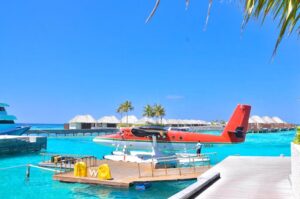The Maldives is best known as a luxury tourist destination, but beyond its image as a holiday paradise, the country has quietly positioned itself as a niche investment environment.
With sustained tourism income, a stable currency pegged to the US dollar, and new investor-residency reforms, it is drawing interest from foreign entrepreneurs and high-net-worth individuals seeking structured entry into a controlled but predictable market.
For disciplined investors who can navigate approvals and structure investments strategically, the Maldives offers a small but resilient market with long-term growth potential in tourism, sustainability, and regional logistics.
This article explores:
- Investing in the Maldives
- Owning Property in the Maldives
- Maldives Golden Visa and Immigration Options
- Expat Taxes in the Maldives
- How to Open a Bank Account in the Maldives
Key Takeaways:
- The Maldives allows 100% foreign ownership through approved investment companies.
- Foreigners can lease, but not own, land.
- Foreigners can open local bank accounts and repatriate profits freely.
- Maldives unveiled a new residence-by-investment program in 2025.
My contact details are hello@adamfayed.com and WhatsApp +44-7393-450-837 if you have any questions.
The information in this article is for general guidance only. It does not constitute financial, legal, or tax advice, and is not a recommendation or solicitation to invest. Some facts may have changed since the time of writing.

How can foreigners invest in the Maldives?
Foreign investors can establish a foreign-investment company in the Maldives, form a joint venture with a local partner, or re-register an existing foreign entity under the new Companies Act.
- To invest, an expat or foreign company must first submit an investment proposal specifying the business sector, ownership structure, and financial commitments.
- Once approved, the investor signs a Foreign Investment Agreement, which sets out the permitted activity, lease terms (if applicable), and conditions for repatriating profits.
- The government charges an administrative fee of USD 5,000 for the application, and approval can take from one to four weeks depending on the project’s complexity.
- Foreign investment in the Maldives operates under a formalized system designed to protect both the investor and the state’s limited land and resource base.
- All foreign participation requires prior approval from the Ministry of Economic Development and Trade through its agency, Invest Maldives. This process ensures that the investment aligns with national development priorities and complies with the country’s zoning, land-use, and ownership laws.
- The most common structure for expats is the foreign investment company, which allows 100% foreign ownership and the appointment of foreign directors. However, certain sectors remain restricted or closed to new foreign entrants.
These are listed in the Foreign Investment Entry Requirements, updated in 2025, which classify activities as open, restricted (requiring Maldivian shareholding), or closed.
This process ensures that foreign capital enters the economy transparently, while giving investors the legal framework to operate safely.
With proper registration, businesses can open local bank accounts, access foreign exchange through approved channels, and remit profits abroad under the protections of the Foreign Investment Act.
Can foreigners own property in the Maldives?
Under current law, foreigners can own buildings or infrastructure they develop on leased land, even though the underlying land remains government property. These structures can be mortgaged or transferred, subject to the terms of the lease.
Property development opportunities for expats usually fall under three categories:
- Tourism resorts and hotels, where investors lease entire islands or lagoons.
- Guesthouses on local islands, operated under joint ventures or local company structures.
- Government-approved mixed-use or real estate projects, which combine residential and commercial use, often tied to investor-residency programs.
Foreigners cannot purchase freehold land in the Maldives. The Constitution reserves land ownership exclusively for Maldivian citizens, meaning expats and foreign entities must operate through leasehold arrangements.
However, these leases (often ranging from 50 to 99 years for tourism projects) provide substantial security of tenure and are treated functionally as ownership for investment purposes.
The government distinguishes between inhabited islands (those with permanent local populations) and uninhabited islands or lagoons, which are used for tourism, industrial, or special purpose projects.
Foreign investors can obtain long-term leases for uninhabited islands through public bidding or direct negotiation under the Uninhabited Land Act and related regulations.
For non-tourism uses such as agriculture, warehousing, or light industry, leases are shorter, typically 10 to 21 years, with renewal options depending on performance and compliance.
There is some discussion around extending these lease-based rights into long-term residency privileges for qualifying investors, particularly those who purchase or develop property in designated investment zones.
However, until the implementing regulations are finalized, foreign buyers should treat any advertised property-based residency schemes with caution and verify them directly with the Ministry of Economic Development and Trade.
Does the Maldives have a golden visa?

Yes. In July 2025, the Maldivian government announced its first residence-by-investment initiative in partnership with Henley & Partners.
This investor visa program is designed to grant residency to those who participate in approved real estate or commercial projects within government-designated investment zones.
Details such as the minimum investment threshold and qualifying property types are still being finalized, but the framework signals a shift toward structured economic residency comparable to programs in Mauritius or the UAE.
Investors under this route are expected to receive renewable multi-year residency permits tied to their qualifying asset or project.
Maldives Corporate Resident Visa
Separate from the investor program, the Corporate Resident Visa in the Maldives offers a streamlined residency process for senior foreign executives and owners of licensed foreign-investment companies.
It allows multi-entry, long-term stay, and renewal linked to the lifespan of the registered business.
Holders can reside and work in the Maldives without undergoing the standard employment-visa process, making it the preferred route for active business operators.
Maldives Work Visas
For those entering to establish a company, explore opportunities, or supervise projects, short-term Business Visas in the Maldives (usually valid for up to 30–90 days) are available.
Once a company is operational, it can sponsor Work Visas for foreign employees, subject to quotas and labour approvals under the Employment Act.
All residency routes require proof of sufficient income or investment, clean criminal record, and valid health insurance.
Dependents can often accompany principal visa holders, though residency rights do not automatically include permanent settlement or citizenship.
Taxation in the Maldives
The Maldives introduced a modern tax regime in 2020, replacing its earlier flat business-profit system with a more comprehensive framework under the Income Tax Act and Goods and Services Tax (GST) Act.
Foreign individuals are taxed based on residency status:
- Tax residents, or those present for 183 days or more in a year, or whose permanent home is in the Maldives, are taxed on worldwide income.
- Non-residents are taxed only on Maldives-sourced income, such as employment, consultancy, or business profits earned locally.
Corporate entities registered in the Maldives are considered tax residents and pay income tax on global income unless specifically exempt.
Tax rates and brackets are updated annually by the Maldives Inland Revenue Authority (MIRA), and businesses must register for tax within 30 days of incorporation.
The Maldives also applies a dual GST system:
- General GST (GGST) — currently 8% on most goods and services.
- Tourism GST (TGST) — 17% as of 1 July 2025 under the 2024 tax amendment.
Tourism GST applies to all transactions involving tourist accommodations, resorts, liveaboards, and related services, while General GST applies to all other sectors.
Businesses must register for GST once turnover exceeds MVR 1 million per year and file returns monthly.
Other taxes and levies include:
- Green Tax: Levied on tourists staying at resorts, hotels, and guesthouses — currently USD 12 per night for resorts and USD 6 per night for guesthouses.
- Customs Duties: Standard import tariffs apply, though SEZ and renewable-energy projects may qualify for exemptions.
- Remittance Tax: The earlier 3% levy on foreign-worker remittances was abolished in 2020, making it easier for expats to transfer earnings abroad.
All registered companies must maintain audited accounts and file annual tax returns through MIRA’s digital portal.
Profits, dividends, and capital can be freely repatriated under the Foreign Investment Act, though the government retains the right to impose temporary controls during extreme currency shortages.
In practice, the Maldives offers a predictable, low-rate tax environment by regional standards.
The combination of a small domestic market, a dollar-linked currency, and a transparent business-tax framework makes it appealing for long-term investors who prioritize stability over scale.
Can foreigners open a bank account in the Maldives?
Yes. Expats working or investing in the country can open offshore bank accounts at major Maldivian institutions such as Bank of Maldives (BML), Maldives Islamic Bank (MIB), and State Bank of India (Maldives).
The need to provide valid immigration documents and proof of income or business registration.
For individuals, banks generally require:
- A valid passport and visa (work, business, or investor type)
- Work permit or business licence from the Ministry of Economic Development
- Employer letter or company registration certificate
- Initial deposit in either Maldivian Rufiyaa (MVR) or US dollars
Foreigners with residency or long-term investor status can open savings or current accounts in both MVR and USD. Short-term visitors may only qualify for limited-purpose or non-resident accounts.
For companies, a corporate account can be opened once the Foreign Investment Agreement and company registration are complete.
Most foreign investment entities maintain multi-currency accounts to manage inflows and outflows, particularly because the Maldives’ financial system operates under a managed USD peg.
However, foreign exchange (FX) access is controlled. Domestic transactions must be settled in MVR under the 2024 Foreign Currency Law, and the central bank prioritizes USD allocations for essential imports and tourism operations.
As a result, some businesses may experience temporary delays in USD remittance during liquidity shortages.
Despite these constraints, the Foreign Investment Act guarantees the right to repatriate profits, capital, and dividends in freely convertible currency.
In practice, repatriation is processed through the banking system once taxes are cleared and documentation verified.
To manage exposure, expat investors typically:
- Keep offshore accounts for USD holdings and reinvestment
- Time conversions strategically to avoid rate stress
- Use Islamic banking products (widely available) for financing and asset protection
Overall, while capital control exists, the Maldives’ system is transparent and predictable for compliant investors.
Maintaining proper records, using reputable banks, and coordinating with MIRA and Invest Maldives ensures smooth transfers and regulatory peace of mind.
FAQs
Why invest in Maldives?
SEZs, particularly the newer Sustainable Townships for projects over USD 500 million, offer incentives like a reduced Corporate Income Tax rate (e.g., 5% for the first 10 years), exemptions from import duty on capital goods, and simplified procedures.
What is the status of the Maldives sovereign credit rating?
Rating agencies like Moody’s have the Maldives at a non-investment grade, e.g., Caa2, but the outlook was revised in late 2025 from Negative to Stable, reflecting positive outcomes from fiscal reforms and strong tourism.
Can foreigners work in Maldives?
Yes, but the government encourages the employment of local personnel, and a foreign employment quota is typically imposed on foreign businesses.
Securing work permits for expatriates is a regulated process.
Pained by financial indecision?

Adam is an internationally recognised author on financial matters with over 830million answer views on Quora, a widely sold book on Amazon, and a contributor on Forbes.



